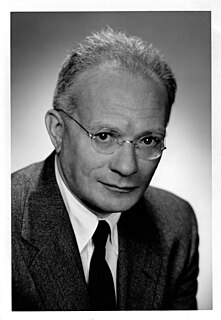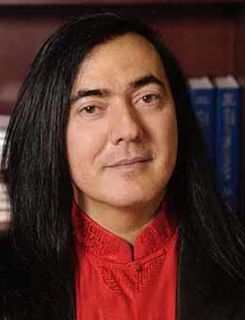
The Diagnostic and Statistical Manual of Mental Disorders is a publication by the American Psychiatric Association (APA) for the classification of mental disorders using a common language and standard criteria.

Narcissistic personality disorder (NPD) or megalomania is a personality disorder characterized by a long-term pattern of exaggerated feelings of self-importance, an excessive craving for admiration, and struggles with empathy. People with NPD often spend much time daydreaming about achieving power and success, and perceive injustice for failing to do so. This is a pattern of obsessive thoughts and unstable sense of identity, often to cope with a sub-par real life. People with the diagnosis in recent years have spoken out about its stigma in media, and possible links to abusive situations and childhood trauma. Such narcissistic behavior typically begins by early adulthood, and occurs across a broad range of situations.

Abnormal psychology is the branch of psychology that studies unusual patterns of behavior, emotion and thought, which could possibly be understood as a mental disorder. Although many behaviors could be considered as abnormal, this branch of psychology typically deals with behavior in a clinical context. There is a long history of attempts to understand and control behavior deemed to be aberrant or deviant, and there is often cultural variation in the approach taken. The field of abnormal psychology identifies multiple causes for different conditions, employing diverse theories from the general field of psychology and elsewhere, and much still hinges on what exactly is meant by "abnormal". There has traditionally been a divide between psychological and biological explanations, reflecting a philosophical dualism in regard to the mind-body problem. There have also been different approaches in trying to classify mental disorders. Abnormal includes three different categories; they are subnormal, supernormal and paranormal.

Clinical psychology is an integration of science, theory, and clinical knowledge for the purpose of understanding, preventing, and relieving psychologically-based distress or dysfunction and to promote subjective well-being and personal development. Central to its practice are psychological assessment, clinical formulation, and psychotherapy, although clinical psychologists also engage in research, teaching, consultation, forensic testimony, and program development and administration. In many countries, clinical psychology is a regulated mental health profession.

Paul Everett Meehl was an American clinical psychologist, Hathaway and Regents' Professor of Psychology at the University of Minnesota, and past president of the American Psychological Association. A Review of General Psychology survey, published in 2002, ranked Meehl as the 74th most cited psychologist of the 20th century, in a tie with Eleanor J. Gibson. Throughout his nearly 60-year career, Meehl made seminal contributions to psychology, including empirical studies and theoretical accounts of construct validity, schizophrenia etiology, psychological assessment, behavioral prediction, and philosophy of science.
The following outline is provided as an overview of and topical guide to psychology:
Joseph McVicker Hunt was a prominent American educational psychologist and author. He promoted and researched concepts related to the malleable nature of child intelligence. That work eventually led to the theory of learning centered on the concept of the information processing system.
Theodore Millon was an American psychologist known for his work on personality disorders.

Narcissism is a self-centered personality style characterized as having an excessive interest in one's physical appearance and an excessive pre-occupation with one's own needs, often at the expense of others.
Lauren B. Alloy is an American psychologist, recognized for her research on mood disorders. Along with colleagues Lyn Abramson and Gerald Metalsky, she developed the hopelessness theory of depression. With Abramson, she also developed the depressive realism hypothesis. Alloy is a professor of psychology at Temple University in Philadelphia, Pennsylvania.
Lee Anna Clark is a professor and William J. and Dorothy K. O’Neill Professor of Psychology in the Department of Psychology at the University of Notre Dame in Notre Dame, Indiana, United States. She used to be a professor and collegiate fellow at the University of Iowa. She was, as of 2007, the director of clinical training in the Clinical Science Program. Prior to her appointment at the University of Iowa, she was a professor of psychology at Southern Methodist University in Dallas, Texas. Her research focuses on personality and temperament, clinical and personality assessment, psychometrics, mood, anxiety, and depression.

David Shakow (1901–1981) was an American psychologist. He is perhaps best known for his development of the Scientist-Practitioner Model of graduate training for clinical psychologists, adopted by the American Psychological Association in 1949.
The following outline is provided as an overview of and topical guide to abnormal psychology:

Psychology encompasses a vast domain, and includes many different approaches to the study of mental processes and behavior. Below are the major areas of inquiry that taken together constitute psychology. A comprehensive list of the sub-fields and areas within psychology can be found at the list of psychology topics and list of psychology disciplines.

Dante Cicchetti is a scientist specializing in the fields of developmental psychology and developmental psychopathology, particularly the conduct of multilevel research with high-risk and disenfranchised populations, including maltreated children and offspring of depressed parents. He currently holds a joint appointment in the University of Minnesota Medical School's psychiatry department, and in the Institute of Child Development. He is the McKnight Presidential Endowed Chair and the William Harris Endowed Chair.
Elaine F. Walker is a psychologist and professor whose research focuses on child and adolescent development, and changes in the brain due to adolescence. Other research interests includes the precursors and neurodevelopment aspects of schizophrenia and other serious mental disorders. She has taken part in writing over 250 articles and six books related to mental health and neuroscience. Walker is the Samuel Candler Dobbs Professor of Psychology and Neuroscience at Emory University.
Barbara Snell Dohrenwend was an American epidemiologist and social psychologist. She was born in New York City to Foster D. Snell and Cornelia Tyler Snell. She received a B.A. from Wellesley College in 1947 and a Ph.D. in psychology from Columbia University in 1954.

Stephen P. Hinshaw is an internationally recognized psychologist, whose contributions lie in the areas of developmental psychopathology and combating the stigma that still surrounds mental illness. He is the author of more than 325 scientific articles and chapters as well as 14 authored and edited books. Currently, he is Professor in the Department of Psychology at the University of California, Berkeley, and Professor In Residence and Vice Chair for Child and Adolescent Psychology in the Department of Psychiatry at the University of California, San Francisco. His work focuses on child and adolescent mental disorders, clinical interventions, mechanisms of change in psychopathology, and stigma prevention efforts, with a specialization in ADHD and other externalizing behavioral disorders.
Deanna Marie Barch is Chair and Professor of Psychological & Brain Sciences and the Gregory B. Couch Professor of Psychiatry at Washington University.
J. Gayle Beck is a licensed clinical psychologist who specializes in trauma stress disorders and anxiety disorders. She is the Lillian and Morrie Moss Chair of Excellence in the Department of Psychology at the University of Memphis.







